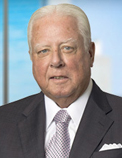© 2013 The Texas Lawbook.
By Mark Curriden, JD
Senior Writer for The Texas Lawbook
AUSTIN (August 30) – When Oregon Supreme Court Chief Justice Paul DeMuniz announced his retirement last year, he got a call from his Texas counterpart.
“I may not be too far behind you,” Texas Chief Justice Wallace Jefferson told DeMuniz.

Jefferson, the state’s first African-American Supreme Court justice and widely proclaimed as one of the best chief justices in Texas history, is expected to announce next week whether he will seek re-election for a third term or go back to the private sector as an appellate lawyer.
By all indications, it appears as if he has decided to leave the Texas Supreme Court, which is the state’s highest court in deciding all business and civil disputes.
“I love being chief justice,” Jefferson, who is 50, said in an interview with The Texas Lawbook several months ago. “I truly enjoy public service and being able to make a difference. I would prefer to keep doing this job, but the difficulty I face is one that many judges face and that is financial.
“There are new first year associates who just graduated from law school making more money today than the chief justice of the Supreme Court,” he says.
Jefferson, who is considered a moderate on a strongly pro-business, conservative court, has one child in college, another who is a high school senior and a third in the eighth grade. He is paid $152,500 annually. If he decides to return to private practice, several large law firms are expected to offer him compensation packages exceeding $1 million a year.
“He told me earlier this year that being on the Supreme Court has been a financial disaster for him and his family,” says Darrell Jordan, a partner in the Dallas office of the Dykema law firm. “Wallace is universally respected among the lawyers of Texas – be they Republicans or Democrats – and it will be a huge loss if he decides to leave the court.”

In an interview earlier this year, Jefferson told The Texas Lawbook that he would probably stay if the Texas Legislature approved the 21 percent judicial pay increase recommended by the state’s Judicial Compensation Commission. State judges had not received a pay increase in eight years and have been among the lowest paid judiciaries in the country.
But in June, the legislation approved only a 12 percent raise, which would bump the chief justice’s salary to $165,000.
“It is going to be a real tragedy if the chief justice is forced to resign because the legislature declined to properly pay our judges,” says Chad Baruch, a Dallas lawyer who specializes in appellate law. “The chief can make an enormous amount of money in the private sector – easily more than $1 million – but his inclination is toward public service.”
In an email, Jefferson declined Friday to discuss his future plans.
Gov. Rick Perry appointed Jefferson to the state Supreme Court in 2001 to replace Alberto Gonzales, who left to become President Bush’s White House Counsel. Perry promoted Jefferson to chief justice when then-Chief Justice Tom Phillips departed in 2004 to lead the appellate practice at Baker Botts.
Appellate law experts view Jefferson as a moderate-conservative on a Supreme Court known for its pro-business and pro-insurance company decisions. He has frequently dissented when he believed those rulings went too far against consumers.
A good example came last year, when a majority of justices, in a case called Timothy Ruttinger v. Texas Mutual Insurance, ruled that the state’s worker’s compensation laws passed two decades earlier eliminated the right of injured employees to sue worker’s compensation insurance carriers that act in bad faith.
Jefferson strongly objected, pointing out that the legislative record makes it clear that lawmakers never intended the law to be interpreted the way the other justices viewed it.
“In doing so, the Court disrupts the statutory equilibrium and substitutes its judgment for the Legislature’s,” he wrote.
Two months ago, Jefferson issued another blistering dissent in a First Amendment libel case when his fellow justices ruled that media outlets and news reporters should be forced to stand trial on defamation charges even when the news they reported was substantially true.
The court’s decision “abridges the freedom to report on a matter of public concern” and it “collides violently with the First Amendment,” Jefferson wrote, objecting to the majority’s ruling.
“By any reasonable standard, Wallace Jefferson is an arch-conservative,” says Baruch, the Dallas appellate lawyer. “But on this Texas Supreme Court, he is well left of center.”

Don Cruse, an Austin appellate law expert who operates scotxblog.com, says Jefferson is “the kind of judge you want to hear your case.”
“He is very attentive of the effect court decisions have on real people and the litigants,” says Cruse. “He’s much more practical in his decision-making. He shows a great appreciation for how the rules of procedure and the facts of a case fit together.”
Legal experts point out that Jefferson is such a believer in stare decisis or the respect for precedent that he once dissented from a decision and later dissented from his own dissent because he said it was too late and that the Court had made its ruling.
“Wallace is not viewed by almost anyone as a political ideologue,” says former Texas Supreme Court Justice Craig Enoch, now a partner at Enoch Kever in Austin. “That gives him great credibility and influence with both the legal community and in the political world.”
Peter Kelly, a Houston lawyer who specializes in appellate law, said even plaintiff’s lawyers agree that Jefferson has “led with a centrist, reasonable voice” during an era when “extreme political pressures” have been placed on the Court.
“Despite pressures from litigants and outside groups, and perhaps even from inside the Court’s chambers, his has been a jurisprudence of temperance and restraint,” says Kelly. “As the head of the third branch of the Texas government, he has been unflagging in his efforts to ensure that the judiciary and the citizens who appear before it have the resources to do justice and equity across the State.”
Jefferson gained national attention as president of the Conference of Chief Justices and as an influential member of the council for the American Law institute, a century-old progressive legal organization that focuses on simplifying complex legal standards.
In addition, he become a national advocate for judicial selection reform by using Texas’s use of partisan elections as an example of how to not choose judges.
“I can make a strong argument that he is the best chief justice in my lifetime,” says former Chief Justice Phillips, who now practices law in Austin.
He has been an extremely consequential chief justice in the administrative area,” he says. “He has accomplished a lot of things I wanted to do and has done some great things I never even thought of.”
Phillips and others say that Jefferson has dramatically improved transparency at the Supreme Court by instituting Internet access to all court oral arguments and to court records. He is overseeing the implementation of electronic filing of lawsuits, briefs, motions and appellate documents in every court across the state.
Legal experts say that Jefferson’s biggest impact has been in the improvement of legal services for the poor and needy. He successfully persuaded legislators this year to significantly increase funding for indigent defense and legal aid programs in the state.
“He is one of the greatest chief justices in our state’s history,” says Harry Reasoner, a partner at Vinson & Elkins and chair of Texas Access to Justice, which administers legal aid programs throughout the state. “Jefferson’s national prestige has no match in our state’s history.”
“Wallace has been very independent in his decision-making,” says former state Supreme Court Justice Deborah Hankinson. “He has made a significant difference.”
Jefferson, in an email Friday, said the Texas Supreme Court “must bear in mind that it is an institution in the best position to enable those who cannot afford legal representation (the poor and, increasingly, the middle class) the opportunity to vindicate their rights in court.
“This responsibility must be met even when there is opposition from interest groups on either side of the docket and even, occasionally, when the opposition comes from the legal profession,” he said.
Jefferson said Friday that the Supreme Court has developed a good relationship with the legislative and executive branches of state government – a relationship that many say has not always been positive in years gone by.
“My experience has persuaded me that the Chief Justice must be willing to engage in a form of public policy to the extent such engagement advances the Chief’s responsibility to have a fair, impartial, and efficient administration of justice,” he said.
© 2013 The Texas Lawbook. Content of The Texas Lawbook is controlled and protected by specific licensing agreements with our subscribers and under federal copyright laws. Any distribution of this content without the consent of The Texas Lawbook is prohibited.
If you see any inaccuracy in any article in The Texas Lawbook, please contact us. Our goal is content that is 100% true and accurate. Thank you.
